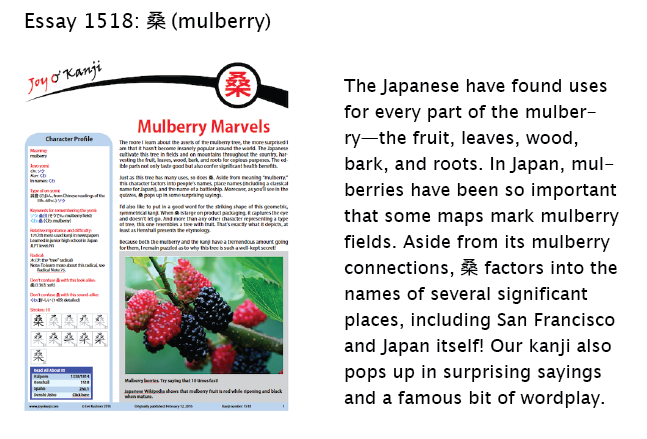The Nerve of Some People
In a recent Skype chat with my language partner, I realized that I didn't know how to say "good at sports" in Japanese. He typed this phrase:
運動神経が良い (うんどうしんけいがよい: athletic)
I laughed when I saw that because I mentally broke the phrase down as follows:
運動 (うんどう: exercise)
神経 (しんけい: nerves)
良い (よい: good)
It made no sense to me! What could nerves have to do with athleticism? I mean, we talk about "having the nerve to do something," but that sort of courage isn't relevant here. And "a case of nerves" is the jitters, which certainly doesn't help in athletic arenas.
My proofreader later clarified matters by presenting 運動神経 along with its antonym:
運動神経 (うんどうしんけい: motor nerves)
感覚神経 (かんかくしんけい: sensory nerves)
The former is for maneuvering the body accurately and skillfully, as in sports. The latter is for sensing things.
He then introduced another word:
反射神経 (はんしゃしんけい: reflexes)
This third type of 神経 is for responding to a stimulus quickly.
If you want to excel at martial arts, your 運動神経 and 反射神経 should both be great.
To be a good swimmer or runner, one needs excellent 運動神経, but the 反射神経 don't matter as much.
I still find it amusing to see 神経 at the heart of any word related to athleticism because I can't help associating 神経 with nervousness, as in these examples:
昨夜彼女は神経が高ぶっていた。
She was a bundle of nerves last night.
昨夜 (ゆうべ: last night); 彼女 (かのじょ: she); 高ぶる (たかぶる: to be high-strung)
彼はそのことで神経をとがらせている。
He is nervous about it.
彼* (かれ: he); とがる (尖る: to become pointed or sharp, shown here in the present-progressive causative form)
To understand the second sentence, we should take 神経をとがらせる as a whole because the meaning of the verb changes in that context. The phrase translates as "to cause nerves to be on edge."
If you're a nervous Nellie by nature (as opposed to having a case of nerves before making a speech), then this term applies:
神経質 (しんけいしつ: nervousness; (being) highly strung; sensitiveness; neurotic)
Then again, maybe it's not so bad to be the nervous type. Look at the antonym:
無神経 (むしんけい: insensitive; thick-skinned)
Wait, does this mean someone who can't be easily offended, as the second definition implies? That's a good trait. But the following sentence indicates that that's not the meaning of this word at all:
クリスはとても失礼で無神経だから私は彼が嫌いなの。
I dislike Chris because he is very rude and insensitive.
失礼 (しつれい: rude); 私 (わたし: I); 嫌い (きらい: disliking)
I've always been intrigued by the vagueness of the English term "sensitive." Sometimes it's hard to know whether it means "considerate of another's feelings" or "feeling things deeply." It seems that 神経 can go both ways, too.
My eye doesn't just go to the 神経 in 運動神経が良い. I'm also drawn to the god at its very heart. That is, 神 (かみ) is "god." And right next to the 力 (power, strength) component in 動, there's an altar (礻)!
Henshall explains the etymology of 神 by saying that the 礻 is indeed an altar and that in this context it means "related to the gods." Meanwhile, the 申 means "lightning," he says, noting that lightning was thought to be a manifestation of the gods (even their voices, according to some scholars). "Spirit" is an associated meaning of 神, he adds.
He defines 神 only as "god" and "spirit," but Halpern has "god" and "mind." That second meaning is crucial if we're to understand 神経. Halpern sees the 神 in that word as conveying "mind, consciousnesss, spirit, soul," or at least some of those.
The word 神経 doesn't point to any kind of separation between the mind and heart. (I love how Japanese blurs the boundaries between the mind, heart, and spirit, as in the wonderful word 心 (こころ), which can mean all those things, plus "feelings," "emotions," and "thoughts.") For that matter, the nervousness that gives us butterflies (or even diarrhea!) proves that there's a tight connection between the brain and the gut, which some people call the second brain.
We're more unified than we think, and the insistence on strict compartmentalization is probably what turned us into nervous wrecks in the first place!
Having said all that, I still find it funny that 神経 is a big part of athletic prowess. I seem to need to cordon off that one bodily function!
Here's a sneak preview of the newest essay:

Have a great weekend!

Comments